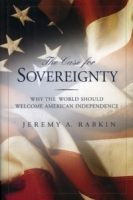| The Case for Sovereignty: Why the World Should Welcome American Independence артикул 3061d. |
 |
Book DescriptionThe Coalition Provisional Authoritys transfer of sovereignty to Iraq elevates the level of public debate about what we mean by "sovereignty " A timely new book articulates the concept of sovereignty and explains why it is the likeliest path to peace In The Case for Sovereignty: Why the World Should Welcome American ожмэо Independence (AEI Press, June 24, 2004), Jeremy A Rabkin argues that sovereignty is the indispensable precondition for constitutional government Without a strong notion of sovereignty, the powers of governments are determined only by the shifting winds of international negotiations between nations that differ a great deal on how to secure peace Continuing debate over the war in Iraq displays in sharp relief how far apart Americans and Europeans have drifted on matters of international law and security Rabkin, a professor of government at Cornell University, explains why European Union (EU) schemes for global governance are fundamentally at odds with the American idea He traces the basis for Americas concept of sovereignty and self-government to the Constitution Traditional notions of sovereignty were, as he shows, central to the outlook of the American Founders In contrast, the postmodern philosophy of the EU draws on premodern and illiberal ideas, along with impulses that fueled extremist political visions in the twentieth century Sovereignty, although inextricably linked to the American idea, is not just good for the United States; it is good for the world Rabkin warns that a "post-sovereign" world would: embolden terrorists and rogue states by inhibiting adequate or timely responses to genuine security threats; destabilize fragile new democracies, as international bureaucrats launch impetuous prosecutions to satisfy outsiders notions about how to punish past abuses; burden trade agreements with unrelated impositionsdepressing economic development in the short term and risking all-out trade wars in the long term; exacerbate conflicts, as different sides are encouraged to frame their claims in the absolutist rhetoric of international rights; undermine respect for law within nations, as national constitutions come to be seen as merely provisional standards, subject to override by international directives; and erode national loyalties and political identities, as governments share governing responsibilities with supranational organizations and constituencies within nations seek to bypass their own governments in direct appeals to outside patrons Europeans charge that American sovereignty is a license for ar. Хотите изменить2004 г 257 стр ISBN 0844741833. |